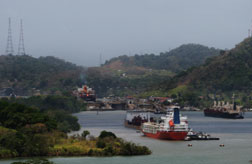 C.J. Schexnayder |
Progress on the $5.2-billion expansion of the Panama Canal has picked up steam with the awarding of the second of five dry excavation contracts to create a $400-million Pacific Locks Access Channel and the approval of entire project's Environmental Impact Assessment by the Panamanian authorities.
At the end of November, Consorcio Cilsa Minera, made up of Mexico's Constructora de Infraestructura Latinoamericana SA (or CILSA) and Panamanian firm Minera Mar�a, presented the low bid of $25.5 million to excavate 7.5 million cubic meters of material in a 2.4 kilometer stretch just north of where the new Pacific locks will be built.
Officials with the Panama Canal Authority – also known by its Spanish-language initials, ACP – said the bid bested seven other consortia vying for the work.
"We're extremely confident in Consorcio Cilsa Minera Mar�a's capability to complete the task at hand," said ACP Executive Vice President of Engineering and Program Administration Jorge L. Quijano. "We have confirmed that they have the experience, financial backing, the necessary equipment and the know-how to get the job done as programmed."
In addition to the dry-excavation, the work includes the construction of a new section of road and a new crossing over the Cocoli River. Site work is expected to begin by the end of the month and the project is slated for completion by the end of 2009.
|
The entire expansion project will add a new lane of traffic through the waterway by the construction of new larger sets of locks on each end of the canal. When completed in 2014, the project will double the tonnage capacity and allow the transit of substantially larger vessels.
The five dry-excavation portion of the project will create a 6.7 km link between the existing navigational channel at the entrance to the Gaillard Cut and the new set of locks that will be constructed on the Pacific side of the canal. The entire Pacific Locks Access Channel will require the removal of 46.8 million cubic meters of material at an estimated cost of $400 million.
ACP officials said they had subdivided the dry-excavation contracts to allow Panamanian firms a better chance to compete in the bidding process. The complex geography of the excavation site was also a factor in the decision.
On Nov. 14, the ACP accepted eight bids for the work on the second contract. The seven that did not win ranged from $31 million offered by Panamanian firm Constructora Urbana S.A. (or CUSA) to $61.75 million International Underground Corp., the sole US firm to cast a bid.
CUSA won the $41.1 million contract for the first phase of the work, removing 7.3 million cubic meters of material at the other side of the access channel. Excavation began in September.
The third excavation contract is scheduled to be announced in the second quarter of next year.
Work on the entire expansion project received a boost last month when the National Environmental Authority of Panama (ANAM) approved the ACP's environmental impact plan for the work.
"With all the environmental impact studies completed and approved by ANAM, the National Environmental Authority, we are in a position to award all contracts as we complete each tender process," Quijano said.
The approval followed months of public consultations with various stakeholders and a comprehensive study on how to manage and mitigate impact on the environment, he said.
URS Corp. prepared the Environmental Impact Assessment (EIA) for the authority. The New York City-based consultant also provided support during the permitting process through to final approval. The work included the formulation of both a Community Participation Plan and an Environmental Management Plan (EMP).
The ACP and ANAM both agreed to monitor the developments of the construction of the third set of locks and ensure that the environmental impact study guidelines are followed accordingly. The Both the EIA and the EMP will be included in the specifications package for the construction of the new locks.
Currently, the ACP is evaluating the Statements of Qualification submitted by four consortia vying to compete to work on the locks aspect of the expansion. The ACP plans to combine the locks into one massive $3.35 billion design/build contract but, due to the size of the project, required consortiums wishing to bid on the project to qualify first.
Thirty companies from more than a dozen countries make up the four consortia and ACP officials say they expect to release the request for proposals for the locks project by the end of the year.
 Related Links:
Related Links: 

Post a comment to this article
Report Abusive Comment